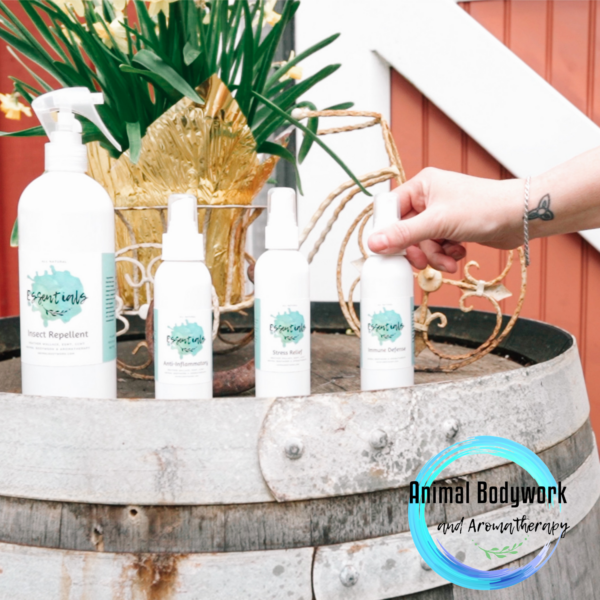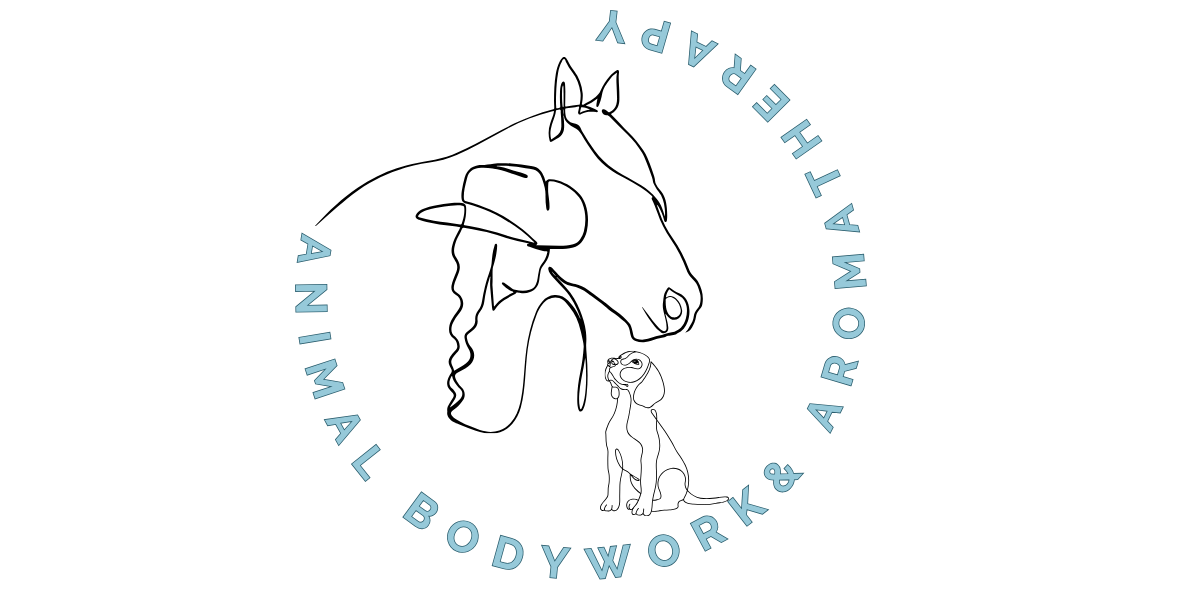Interested in Using Essential Oils on Your Animals?
Look no further. Over the last few years, essential oils have been increasingly popular. I can’t tell you how many times I have spent time with another parent at a playdate who is using a diffuser in the kitchen or a client who says they have tried [insert essential oil here] on their horse. It’s wonderful that people are looking for alternatives to modern medicine.

My guess is that you have some experience at this point using essential oils on yourself or loved ones. If not, I seriously recommend doing so before you move to animals. You will not only learn a lot from using oils yourself regarding proper use and dosage to avoiding potential problems. Animals are very receptive to the use of essential oils and aromatherapy and can be very sensitive.
Essential Oils and Animals
It was my mother who turned me on to essential oils many years ago. I was happy to try an alternative to chemicals that are so prevalent today, but I did a lot of research. I used it on myself, before ultimately extending it to my children in smaller dosages. A little goes a long way with oils, especially on children and animals. So when I made sure I knew what I was doing, I started working with my dogs. Increasingly I found a hundred uses. Now I have a large and varied collection of oils and blends. I do everything from making my own cleaning products to providing customized blends and products for our equine and canine clients.
My dogs have benefited from my home collection, but I have to be very careful because animals are very sensitive. And let’s not forget their delicate sense of smell either. When dealing with horses and dogs, often essential oils are too strong. A good choice in many cases it to use hydrosols instead. Many of you are probably wondering, what in the world is a hydrosol? In a nutshell, it is a much less concentrated product.
Hydrosols
Also known as floral waters, flower waters, or distillates are products from steam distilling plant materials. They are like essential oils, but much more diluted and are in fact, a byproduct of making essential oils. This makes them ideal for children and animals. Not every Certified Therapeutic Grade Oil (CTGO) company provides them. You can find them at:
- Mountain Rose Herbs
- Eden’s Garden
Essential Oils
An essential oil is a liquid that is generally distilled (most frequently by steam or water) from the leaves, stems, flowers, bark, roots, or other elements of a plant. Essential oils are more concentrated than hydrosols.
Ways to use Essential Oils and Hydrosols on Animals
In the wild, animals pick and choose the healing plants they need to help them stay healthy. Scientifically, this is known as zoopharmacognosy. When working with essential oils, we use this instinct and allow the animal to choose what they need, just as they would in the wild. If your animal turns away from the smell he/ she is indicating this is not the oil for them at this time or it is too strong.
- Topically. Neat (alone) or with a carrier oil, such as fractionated coconut oil, jojoba oil, grapeseed oil, almond oil to name a few.
- Orally. Dosage depends on the weight and sensitivity of your animal. You may add small amounts directly on the tongue or gums, or in drinking water.
- Inhalant. I like to put them on my hands and have my clients sniff and lick depending on the blend used. Diffusers also provide steam using the oil of your choice. Another option is to simply open the bottle and encourage your animal to inhale deeply several times.
Where to Buy Essential Oils
Please, please, please DO NOT buy your essential oils from the grocery store. Very rarely you will find doTerra products in a Whole Foods but it is uncommon. The products you find in grocery stores are not high quality. ONLY use oils that have undergone a rigorous vetting process and received a Certified Therapeutic Grade stamp.
You will find there are many essential oil products are on the market today. It’s hard to narrow down and decide which way to go. Below I have listed a few companies that I like and use. doTerra and Young Living are similar to a COSTCO. You can order become a member for an annual fee and receive 25-35% discounts off all purchases as well as have access to your own website for purchase. Usually, this is done with a sponsor, such as doTerra’s Wellness Advocate, who receives a small commission at no cost to you.
I am a Wellness Advocate for doTerra, and buy many of my oils through them, as well as sell them to clients directly. BUT at this time doTerra does not sell hydrosols and I don’t believe in limiting my options. So here are a few companies with good reputations and availability. Take a look around and see which you prefer.
- doTerra (My Wellness ID is 3184569)
- Young Living
- Rocky Mountain Oils
- Mountain Rose Herbs
- Eden’s Garden
You can get lost in a sea of choices. Most of the companies above will have either an enrollment kit or set of 6 oils that you can start with, but it is optional. Below I’ve listed some of my favorites, and the most common oils I use on our equine and canine massage clientele.
Best Oils for Horses

- Abcess: Melaleuca; Oregano; OnGuard (doTerra)/ Thieves (Young Living); Lavender
- Anxiety: Serenity (doTerra); Peace & Calming (Young Living); Lavender
- Scrapes & Bites: Lavender; Lemon; Meleleuca
- Fly/ Tick Repellent: Melaleuca
- Marish behavior: Clary Sage; Geranium
Best Oils for Dogs

- Anxiety: Serenity (doTerra); Peace & Calming (Young Living); Lavender
- Arthritis: Peppermint; White Fir
- Flea/ Tick: Melaleuca; Peppermint
- Hot Spots and Allergies: Lavender; Geranium
- Cracked Paws: Lavender; Frankincense; Geranium
* A note about cats. Some essential oils are toxic to cats and should not be used on them without a veterinarian’s advice.
Dosage
I cannot recommend a dosage at this time. It depends on weight, sensitivity of your animal, and need. Not helpful, I know. Sorry. But what I can tell you is to start with the lowest possible dosage. Then slowly increase if well tolerated. Keep in mind essential oils are very concentrated so a little goes a long way. A diffuser may only need a 2-3 drops where a salve or spray with a carrier oil may use more.
Dogs, horses, and people have reaped a multitude of benefits from essential oils when used safely and correctly. The best use is as a complement to modern medicine (not an alternative), and to aid self-healing. I should note though that I still have a love of Excedrin when a migraine hits and believe sometimes antibiotics are necessary! I don’t eschew modern medicine completely, but try to support my immune system naturally whenever I can.
Warning: Always spot test first on your animal. Some adverse reactions to oils include rubbing at the site, pacing, rash, vomiting, and diarrhea. If one of these occurs, stop use immediately. Wash the site with mild soap and water. In severe cases it may be necessary to counteract topical use with milk. Cats are unable to process many of the essential oils so do not use unless directed by a professional.
Did you know that I make custom essential oil blends for my clients? I also take special orders of my most popular products. Visit my Aromatherapy page to submit a consultation request or shop my signature products.
Interested in learning more about aromatherapy for animals? Submit your questions below.
